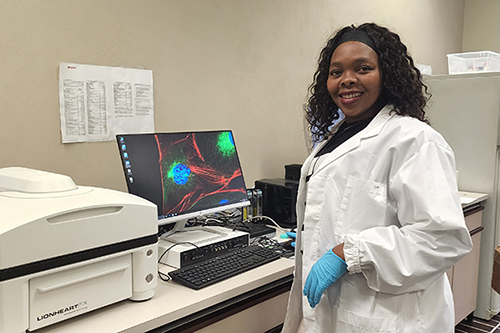North-West University (NWU) academic Prof Sithandiwe Mazibuko-Mbeje was able to indulge in a number of her passions last year when she was awarded a University Capacity Development Grant to visit Università Politecnica delle Marche in Italy.
Since October 2022, Prof Mazibuko-Mbeje has been working under Prof Luca Tiano, who specialises in oxidative stress, inflammation, metabolic disease and skin aging. This is a perfect opportunity for Prof Mazibuko-Mbeje, who is researching on mycotoxins and oxidative stress in various cell lines.
Mycotoxins are secondary fungal metabolites estimated to contaminate 60 to 80 percent of agricultural commodities such as wheat, maize and animal feed across the world, and poses a threat to human and animal health.
Toxins cause disorders and accelerate metabolic syndrome
“These toxins pose a risk to humans directly through the dietary consumption of contaminated grains such as wheat and maize, and indirectly via the consumption of animal products. T-2 toxin poisoning induce oxidative stress and apoptosis, increase inflammation and can lead to disorders of the immune system, skeletal muscle, skin, gastrointestinal and reproductive system,” she explains.
She is investigating the protective and preventative effect of using natural plants with antioxidant properties and other known compounds, such as CoQ10, against T-2-toxin-induced oxidative stress in various cell lines.
“These results can positively impact the development of nutraceuticals that can be used to prevent or reverse the effects of these mycotoxins. I hope to generate data that will be published in high-impact factor journals and benefit the country as one of the natural plants I am investigating is grown in South Africa.”
Never lose hope
Becoming an associate professor in biochemistry at 35 has been Prof Mazibuko-Mbeje’s most significant achievement to date.
Raised by a single parent and her grandmother, she has come a long way from Loskop (Estcourt) in KwaZulu-Natal where she had to walk kilometers and cross rivers to get an education.
In 2000, Prof Mazibuko-Mbeje completed her secondary education at Sizathina High School. As she lacked the money to go to university, she spent 2021 working in a factory. Being a girl with big dreams, she did not lose hope and enrolled at the University of Zululand in 2002 to do a BSc in biochemistry. From there, she never looked back.
One thing leads to another
She started her career as a laboratory assistant at Ntunjambili Hospital in 2005.
In 2007 she registered for her honours degree at the University of Zululand. In the same year, the South African Medical Research Council (SAMRC) appointed her as a research technologist.
“This is where I conducted my research from my honours degree up to my PhD in biochemistry. My research focus was the beneficial effects of natural plants and compounds such as rooibos and aspalathin in various experimental models of insulin resistance and type 2 diabetes,” says Prof Mazibuko-Mbeje.
During that time, she worked hard, secured funding and presented and published locally and internationally.
After completing her PhD, she secured a postdoctoral position for two years at a well-known research centre, Helmholtz Zentrum, in Munich, Germany.
She joined the NWU as associate professor in 2020, leading the Obesity and Mitochondrial group.
Prof Mazibuko-Mbeje is also a National Research Foundation-rated scientist with more than 60 publications.
Her words of encouragement to young people are: ‘‘Never allow the current situation to stop you from reaching your dreams. The sky is the limit.”

Prof Sithandiwe Mazibuko-Mbeje
